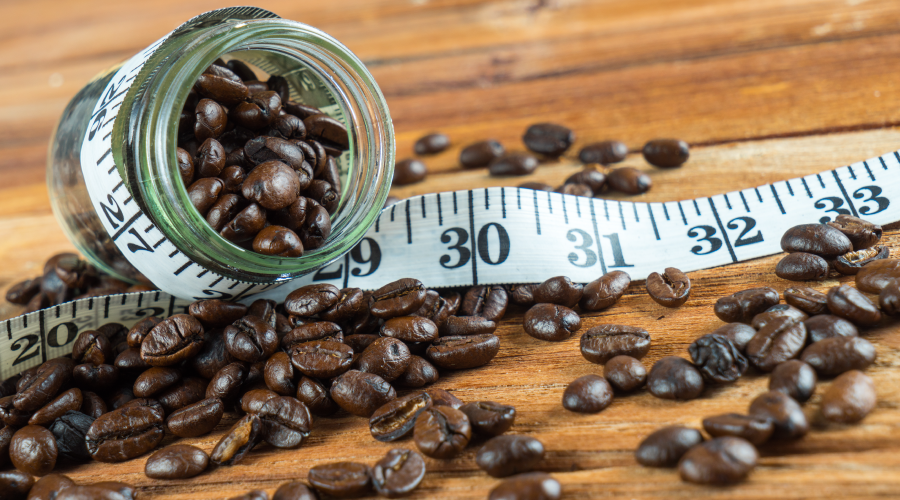

A cup of coffee in the morning, hot or cold, is enough to kickstart your day, while others may sip on it just after the afternoon nap. The beverage leaves you refreshed, alert, and agile. But the energy-boosting elixir is accused of packing calories. So, does coffee increase weight? Read through to know.
What Does Coffee Do to Your Body?
Coffee is naturally rich in caffeine, a compound known for its stimulant properties. Caffeine is quickly absorbed from the gut into the bloodstream. The levels peak within 30 minutes of consumption and keep you active and going for about 3 hours.
During this time, caffeine tweaks the functions of various body systems. These include:
- Caffeine stimulates the brain cells and the central nervous system. It blocks the levels of adenosine, a chemical linked to drowsiness and sleepiness. The brain thus becomes more active as well as alert and feels less tired, in turn pushing the whole body into feeling active and charged up.
- Caffeine activates the production of epinephrine (adrenaline). This is the body’s fight or flight hormone, which gives the body an instant kick.
- Coffee is known to boost pleasure. It causes the release of endorphins, chemicals that help alleviate pain, reduce stress levels, and make you feel happier and satisfied.
Coffee and Weight Management
The effects of coffee on weight management are mixed.
Caffeine has thermogenic properties which help you burn more calories to release energy and also aid fat burning through lipolysis, i.e. breaking down the fats in fat cells. Coffee is low in calories. It leaves you calorie deficient both by increasing activity levels and providing fewer calories. Coffee boosts the metabolism, which allows you to burn more calories quickly. And its effect on the hunger hormone reduces appetite.
These properties make coffee an ideal addition to weight loss diet plans.
But contrary to naturally present weight loss attributes, coffee is also linked to weight gain. This is because of the stimulating effect and additional ingredients used to prepare a satiating cup of coffee.
How Does Drinking Coffee Lead to Weight Gain?
Despite being beneficial for weight loss, coffee encourages weight gain in the following manner:
1. Disrupted Sleep Pattern and Weight Gain
Caffeine is a stimulant. It blocks the effects of adenosine. As the brain gets an extra energy kick, it affects the healthy sleep pattern. Research suggests that poor sleep is known to increase cravings and appetite for processed and sugary foods. It’s these unhealthy eating habits that spur weight gain.
2. Coffee Pairings can be Harmful
Coffee is a beverage for a pleasurable lifestyle. Its unique bitter taste often gels well with a sweet treat. Thus, people sipping a cup of coffee like to pair it with a pastry, cookie, or other sweet treats. Daily intakes of high-sugar snacks that accompany a cup of coffee eventually lead to weight gain.
3. Coffee Ingredients can Pack Calories
A 250 ml cup of black coffee contains around two calories. But this may not be as palatable as a coffee dressed up with bitterness.
To make coffee tastier and lip-smacking, milk, sugar, and flavours are typical additions. It’s the regular intake of these ingredients that associate coffee with a higher risk of weight gain and obesity.
4. Serving Size can be a Culprit
The higher the caffeine intake, the higher will be its stimulating effect. Too much caffeine directly affects the quality of sleep and sleep patterns which may increase the tendency to binge on unhealthy snacks contributing to weight gain.
As the serving size of coffee increases, the intake of other coffee ingredients also increases. This can have a direct bearing on weight gain.
5. Your Coffee Recipe Matters
Coffee made from full-fat milk or almond milk with added sugar, syrup flavourings and perfectly done up with whipped cream will pack more calories. Whether coffee will add kilos to your weight or not will depend upon how you like your cup of coffee.
If you are on a Keto or Paleo diet and prefer to pack your coffee with coconut oil, butter, or MCT oil, your coffee is simply too high in fats and calories.
Recommended Daily Consumption of Coffee
Do you need to quit coffee to keep your weight in check? The answer is ‘no’. However, the consumption of coffee must be limited to no more than 300 mg of caffeine per day. This translates to three cups of coffee per day.
How to Make Your Coffee Healthier?
If you are concerned about coffee-related weight gain, consider switching to black coffee. A simple shot of caffeine without any milk and sugar will act as fuel for the body and mind with no added calories and weight gain worries.
Drinking black coffee is also known to suppress your appetite, helping you eat less. It boosts metabolism, helping you burn more calories. But if you do not like the taste of black coffee, try creating your cup with reduced additions and healthy ingredients.
- Cut down on whipped cream.
- Go fat-free by switching from whole milk to skimmed milk and eventually fat-free milk.
- Go sugar-free. Try reducing the amount of added sugar to your cup of coffee or use natural, no-calorie sweeteners, such as stevia.
- For Bulletproof coffee, try switching to healthy fats like grass-fed butter or coconut oil.
Remember, it’s not possible to switch from creamy, frothy, or sugary coffee to plain black coffee instantly. The transition will be slow and gradual. Every alteration you make to your cup of coffee, give it a week’s time to adapt to the new taste before you bring on the next change.
Do not binge on bottled coffee as it is packed with added sugars and loaded with calories. Prefer brewing your coffee at home. And relish your mug without any additional side-orders. Try reading a newspaper, watching television, or chatting with your friends; this will distract you from munching alongside.

When to Drink Your Coffee?
The time of the day when you prefer your coffee cup will also decide its impact on the body. Consider reconsidering if you prefer drinking on an empty stomach in the morning.
The added sugar in the coffee will hit the bloodstream faster when you drink it on an empty stomach. Due to the long gap from the last consumed meal, all of the sugar is quickly absorbed and stored in the body. This leads to weight gain.
Drinking coffee or consuming caffeine post dinner is not a good idea either. Caffeine disrupts sleep patterns and interferes with hormones. It increases the release of the hunger hormone and reduces the production of the feel-good hormones. This triggers food cravings and weight gain.
Conclusion
Coffee does not pack calories and standalone cannot be accused of weight gain. Its thermogenic properties boost fat burning and metabolism, which promote weight loss.
But the way coffee is paired and used with other foods can push you into weight gain. Brewing your coffee with full-fat milk and loading it with extra sugar, flavourings, and whipped cream will surely add to calories and weight. Also, as coffee negatively affects sleep, it is linked to food cravings and unhealthy munching.
Prefer black coffee to minimise your risk of weight gain with coffee. But if you choose regular coffee over black coffee, be careful of the ingredients used. Try cutting down on extra calories.
Also, be mindful of how much you drink. Excessive coffee intake can also lead to weight gain due to its high caffeine content. Limit yourself to not more than two-three cups per day.
Lastly, your timing of sipping your coffee will also decide its action on the body. Drinking coffee with added sugar on an empty stomach is not recommended. Likewise, consuming coffee as an after-dinner beverage can be disastrous for weight gain. Try pairing your cup of coffee with breakfast or sip it as an early-evening beverage to enjoy its maximum benefits.




